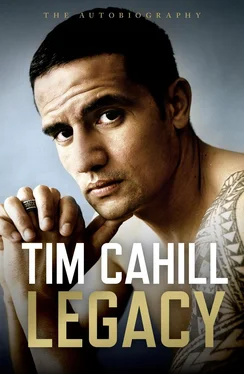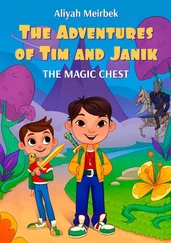After my indoor football games, we’d drive to a small Greek gyros shop in Marrickville. We’d go there on Thursday night, excited because it was our one treat for the week. I’d order a beef gyros with lettuce, onions and barbecue sauce, and many times my mum wouldn’t order: “No, I’m okay—I don’t want anything.”
I’d eat only half, handing the rest to my mum, saying, “Sorry, I’m full.” She’s a very astute woman, but to this day she probably doesn’t know that I understood the reason she didn’t order anything was because, first and foremost, she was always looking out for us.
And even now, regardless of how much I’m earning as a footballer, she hasn’t changed. Whenever we go to a restaurant in Australia, my mother will pick the cheapest item on the menu. I’ll smile and say, “Mum, go ahead, order whatever .” But it doesn’t matter—she’s still as economical as she was when I was a kid.
REACHING HIGHER Contents Cover Title Page Copyright Foreword by David Moyes Part 01: Beginning the Dream Fearless Reaching Higher Golden Bicycles and Olympic Dreams Lessons from Samoa Beating the Odds Part 02: No One Likes Us, We Don’t Care Sacrifices England The Lion’s Den Samoan Fire Down But Never Out The Cup Run The Call-up Part 03: Once a Blue, Always a Blue Everton Gladiators One City, Two Colours The Boys in Blue Making History All Good Things Rolling Back the Years Part 04: Glory America Brazil and Beyond Green and Gold New Horizons Legacy Acknowledgments Plate Section About the Publisher
THE NEXT LEVEL UP IN my youth career was when I joined Lakemba Soccer Club and was selected to play for Canterbury Reps. Now I’d joined an elite group of boys. One of my best mates, even to this day, Anthony Panzarino, was to become a massive influence on my development. Anthony and I hit it off immediately and were soon inseparable. We played together for both Lakemba and the Reps. Canterbury had more than a dozen club teams; if you’d done well at your club, you’d receive a call up, but only one or two players from each club got the honour.
Only a few players from Lakemba were selected. Making it to Canterbury Reps was a pretty big deal; this was no longer football as recreation. If you made the team you’d travel all around Australia. We were ten and eleven years old, the age when we were starting to find ourselves as footballers, and travelling with Canterbury opened the world to us.
I remember during our Lakemba and Canterbury Representative days it seemed like we never stopped playing football. If we weren’t in class—or sleeping—we had a ball at our feet. I’d go round to Anthony’s house, kicking the ball with him for an hour before training, shooting and passing against the wall or along the side of his garage.
Anthony and I both had long hair down the back of our necks like so many of the great Italian and Latin American players in those days. We were trying to look like Redondo, the brilliant Argentine midfielder; just about everything else we did was an imitation of the big-time professional footballers: the way they walked, their mannerisms we’d seen on the TV, right down to how they wore their kit.
At home, Anthony’s dad, Mick Panzarino, always watched Italian league matches. Anthony’s mum, Beatrice, would put out a huge spread of food. His dad would sit at the head of the table and we’d feast on fresh-baked Italian bread, salads, pastas, meatballs and imported mozzarella, while watching those matches from Italy on the TV in the living room.
I used to love going to the Panzarinos’, especially after training when we were always ravenous. I’d never tasted better food in my life.
Anthony and I didn’t have one single day in the week when we weren’t playing football. Talk about a time commitment: there were loads of driving and logistical arrangements for our parents. During the indoor season our schedules were packed. Lakemba matches on Saturday, Canterbury Reps on Sunday, indoor matches with the Banshee Knights on Thursday afternoon.
Add in practices for all those teams and there was really not a single day of the week when I wasn’t either in training or playing a competitive match. Football consumed my entire life, but I didn’t want anything else. I didn’t want to hang out and do what the other kids from school were doing. And, outside of games and practices, Anthony and I would put in hours training on our own at his place. Looking back on it now, it’s obvious we were little machines who were completely in love with the game.
By this time in our lives we were getting a reputation as an elite group, and I was lucky to be among such skilled young players. My parents still have a clipping from one of the Sydney papers that referred to us as “the Maradonas of tomorrow”. For a kid my age, at that time, there was no higher compliment.
Such a fantastic age, too. We had so much energy, jumping fences, meeting up after school. My mates and I would quickly ring each other after school and go to the park with my brothers Sean and Chris. We’d play three v. three. I remember getting into punch-ups because one team had lost 1–0 or 2–3 or some such foolishness—I mean, we took those kickabouts that seriously. We’d fight over who scored, or who fouled whom. Whether it should be a throw-in or a corner kick—any little thing. Then we’d run home to our own houses. And the next day—it didn’t matter that we’d fought the day before—we’d ring each other up and do it all over again.
Those are priceless childhood memories. I could never stand losing at anything. Not with my brothers, not with my mates. Just wasn’t acceptable. Years later, funnily enough, when I was playing for Everton, I’d find myself having a similarly competitive friendship with one of the most gifted footballers of the Premier League, the Spaniard Mikel Arteta.
Some days Anthony’s dad would take us to training, other days it would be my dad’s turn. But no matter who was driving there was no small talk: these were serious football lessons. The whole way to training, our dads would talk tactics and strategy: how we were going to play and link up together as midfielders. If it was a game day, the talk would be more motivational—“How badly do you want to win, boys?”—right down to the level of asking us if our boots were clean. It’s those details that show your level of passion, pride and commitment to the sport.
When it came to football both our dads knew what they were talking about. With my father, it was bred in the bone: that hard-core working-class Londoner’s love of the game. With Anthony’s father, there was more Italian flair, but he was equally passionate.
Anthony and I usually huffed and puffed and muttered under our breath: “Bloody hell, our dads don’t know nothing …” But I can see now how much they did know, and how deeply they affected our lives.
I can still hear Anthony’s father’s voice as we’d drive to the Lakemba training sessions.
“Anthony, you need to shoot more—you’re taking too long on the ball” or “Anthony, you need to get the ball wide to the wing, so Tim can meet the cross. And you both need to link better together.”
Anthony and I formed a solid partnership on the pitch. We both played in midfield. Sometimes I’d play slightly in front of him. We each had our strengths. He had a really powerful shot. I had strong heading ability and vision.
Still, I was a long way from a finished article at that age. Some of the other kids had better shots, great touch and control of the ball. At that stage in our lives, I often played with kids who were more polished and technical. I wasn’t discouraged if I saw one of my mates, or one of my brothers, had a better shot, though I’d sometimes shake my head in amazement when he’d strike a precise volley into the back of the net. If anything, my admiration for that skill fuelled my own ambition. It inspired me to improve my own shooting. I’d find myself studying everything my mates did to generate that same power.
Читать дальше












